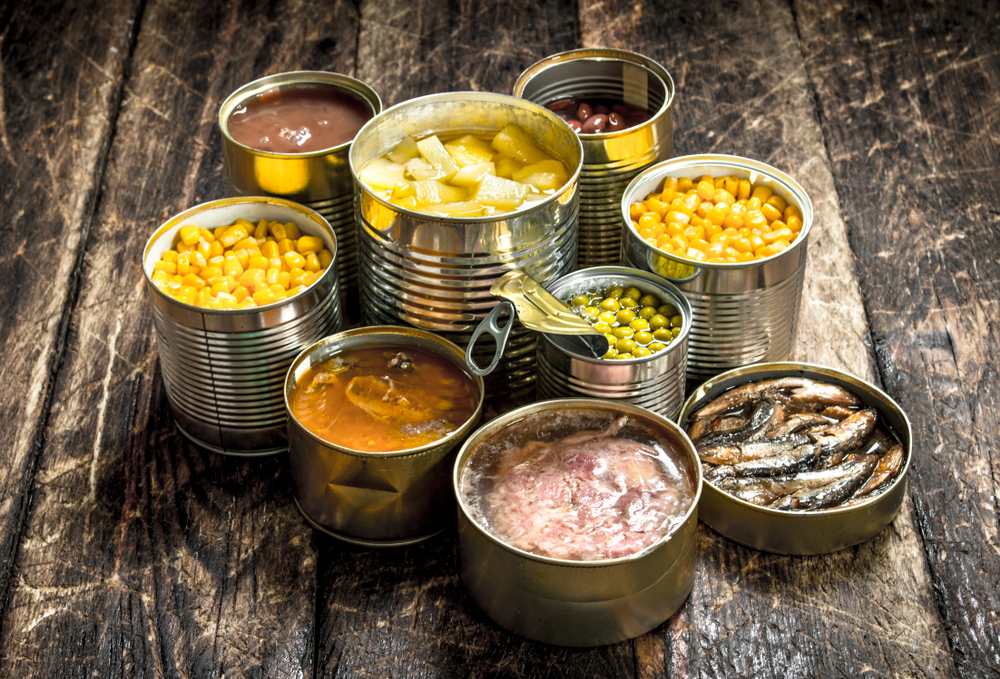Last Updated on March 9, 2023 by admin_hunter
When thinking of long term survival, a good question to ask should be “what survival foods have a short shelf life”?
A good survival kit should have a wide variety of foods that are easy to prepare. These foods can also provide the calories and nutrition you need during an emergency.
However, not all food will last as long as you hope. That’s why it’s important to consider the shelf life of your survival food kits.
1. Canned Meat
When it comes to survival foods, you don’t want to rely on canned meat too much. It can be very nutritious, but it also has a short shelf life.
This is why you should only eat it when you’re sure it’s safe to eat. Highly processed meats often contain high amounts of fat and sodium, plus chemical additives.
It can be dangerous to eat too much of these preservatives, especially in an emergency situation when your body isn’t used to them.
Luckily, there are some canned meats that have a long shelf life and don’t need refrigeration. Spam is a great example of this, but other canned meats can be just as good for your long-term survival food supply.
2. Canned Vegetables
Canned vegetables are a convenient and cheap way to incorporate more fruits and vegetables into your diet. The canning process allows vegetables to stay fresh for a long time and kills off bacteria.
While canned vegetables may not taste as fresh as raw, they are still a great addition to any meal. They are a good source of vitamins and nutrients, and can be used in soups or reheated with butter and herbs for added flavor.
Canned vegetables are typically available in several different varieties, so it’s easy to find the perfect match for your family. Some of the most common include peas, corn, mixed vegetables, potatoes, carrots, and spinach.
3. Canned Fruit
Canned fruit is a great way to have a nutritious snack on hand without having to run out to the store. Watch for case lot sales in your area to stock up on canned fruits.
Canned fruits can last for months or years when stored properly in a pantry. They are also a healthy choice because they contain less sugar and sodium than many other options on the market.
One downside of canned fruit is that the processing can wipe out some of its nutrients. Specifically, the canning process and added sugar can reduce the vitamin C content by up to 20 to 40 percent.
4. Canned Fish
Canned fish is one of the most convenient foods you can bring with you on your journey, and it’s also a healthy addition to your diet. It has a high concentration of Omega-3 fatty acids, which help lower your risk for heart disease.
The best kind of canned fish is wild-caught, which means it has been caught in the open ocean and not cultured on a farm like farmed fish do. Because it was not cultured, it’s much healthier and more nutritious than its farmed counterparts.
Canned sardines, in particular, are one of the best options because they contain low levels of mercury and are a good source of calcium. Sardines also have a high Omega-3 content, which makes them ideal for people who want to stay heart-healthy.
5. Canned Milk
Canned milk is a convenient way to get cow’s milk on hand without the hassle of going to the store. It’s made by heating milk until at least 60% of the water evaporates, which creates a thicker, creamier, and darker product.
It’s also heat-sterilized and canned to extend its shelf life. That’s why it’s so handy for baking and cooking.
You can use a can of evaporated milk in place of regular milk in many recipes, including soups, sauces, custards, and desserts. It’s especially great for creamy white gravy and dressings.
Evaporated milk can last for a long time in the pantry, but it’s best to use it within three to five days of opening it. It’s also best to buy canned milk that doesn’t leak or have dents around the lid. Dented cans are a major source of botulism poisoning and should be avoided at all costs.
6. Canned Eggs
Canned eggs are a great survival food that can last for years as long as they’re stored properly. The only thing you have to worry about is storing them at the right temperature and humidity to avoid spoilage.
Aside from the refrigerator, you can also store them in a cool, dry place like your basement. Ideally, you should consume them within 12 months of canning them.
Moreover, be sure to check the date on the carton before you buy them. Typically, the date is the day that the eggs were packed and sealed.
You should also pickle the eggs before canning them for added shelf-stability and flavor. This is done with a vinegar-based brine solution which will help preserve them.
7. Canned Pemmican
Pemmican is a traditional, healthy, high-energy, calorie-dense, emergency and trail ration that can be made in nearly any survival situation. It is also a very easy food to make, as it doesn’t require special equipment or ingredients.
It is a meat-based powdered food that is mixed with animal fat (usually beef tallow), dried fruit, and salt. This combination is extremely durable and a great addition to any wilderness diet.
This is one of the best disaster foods to have, because it is packed with protein and vitamin C. It also helps to boost morale, which is especially important when you’re stuck in a survival situation.
8. Canned Powdered Eggs
One of the most popular items among preppers and survivalists is powdered eggs. This type of egg substitute is easy to store, nutritious and tasty.
Unlike fresh eggs, this egg substitute will not spoil over time due to humidity or exposure to oxygen. They can last for years when stored in a cool and dry place.
This type of egg substitute is made from dehydrated whole eggs, egg whites or egg yolks and can be purchased at a much lower price than fresh eggs. They are an excellent source of protein, vitamins A and D, choline and amino acids.
They can be mixed with other dry ingredients, like flour, to create a variety of baked goods and meals. They can also be used to make scrambled eggs, omelets and French toast. Several brands of powdered egg are available on the market and it is important to select a brand that works well for your family.
9. Canned Berries
Canned berries, like other canned foods, will begin to lose flavor and nutritional value with time. If stored in a cool, dry place, however, this shelf life can be extended significantly.
If you want to keep fresh berries around for longer than a few days, freeze them. This will extend their shelf life without losing any nutrients or affecting their quality.
When storing frozen berries, use freezer-quality zip lock bags to make sure they stay airtight. This will prevent freezer burn and keep them tasting great for months.
10. Canned Alcohol
If you’re trying to prepare for a disaster, it’s important to have foods that don’t spoil quickly. These foods should be kept in a dark, cool, and dry area without humidity or moisture.
Keeping these foods properly stored will help them last for years. You can store them in an air-tight container or vacuum-seal them.
These non-perishable survival foods may change their flavour and texture over time, but they are still completely edible and safe to consume. They’ll also retain a lot of nutrients, which is important for ensuring you get all the vitamins and minerals your body needs.
Canned alcohol can be a valuable addition to any survival food stockpile. It provides energy, helps prevent infections, and can even be used to soothe wounds. Moreover, it has a relatively long shelf life as long as it’s stored in a dark, cool, and dry place.

